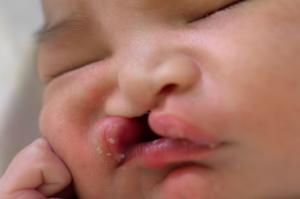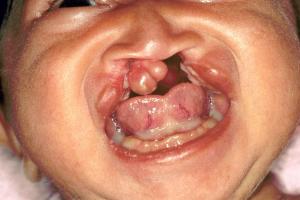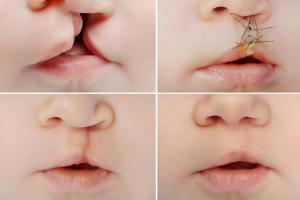Cleft lip and palate
A cleft is a gap or split in the upper lip and/ or roof of the mouth (palate). It is present from birth. The gap is there because parts of the baby's face didn't join together properly during development in the womb.
About cleft lip and palate
A cleft lip and palate is one of the most common facial birth defects.

Babies can be born with a cleft lip, a cleft palate, or both. A cleft lip may just affect one side of the lip or there may be two clefts.

It can range from a small notch to a wide gap that reaches the nose.
A cleft palate may just be an opening at the back of the mouth, or it may be a split in the palate that runs all the way to the front of the mouth.
Sometimes it can be hidden by the lining of the roof of the mouth.
The Cleft Lip and Palate Association has a photo gallery with pictures of cleft lips and palates before and after surgery.
Problems related to cleft lip and palate
Cleft lips and cleft palates can sometimes cause a number of issues. This is particularly in the first few months, before surgery is carried out.
Problems that can occur include:
- difficulty feeding – babies with a cleft palate may be unable to breastfeed or feed from a normal bottle because they can't form a good seal with their mouth
- hearing problems – some babies with a cleft lip are more vulnerable to ear infections and a build-up of fluid in their ears (glue ear), which may affect their hearing
- dental problems – a cleft lip and palate can mean a child's teeth don't develop correctly and they may be at a higher risk of Tooth decay
- speech problems – if a cleft palate isn't repaired, it can lead to speech problems such as unclear or nasal-sounding speech when a child is older
Most of these problems will improve after surgery and with treatments such as speech and language therapy.
Causes of cleft lip and palate
A cleft lip or palate happens when the structures that form the upper lip or palate fail to join together when a baby is developing in the womb.
The exact reason why this doesn't happen in some babies is often unclear.
In a few cases, cleft lip and palate is associated with:
- the genes a child inherits from their parents (although most cases are a one-off)
- smoking during pregnancy or drinking alcohol during pregnancy
- obesity during pregnancy
- a lack of folic acid during pregnancy
- taking certain medicines in early pregnancy, such as some anti-seizure medications and Steroid tablets
In some cases, a cleft lip or palate can occur as part of a condition that causes a wider range of birth defects, such as DiGeorge syndrome (22q11 deletion) and Pierre Robin sequence.
Diagnosing cleft lip and palate
Cleft lips are usually picked up during the mid-pregnancy anomaly scan carried out when you're between 18 and 21 weeks pregnant.
Not all cleft lips will be obvious on this scan and it's very difficult to detect a cleft palate on a routine ultrasound scan.
If a cleft lip or palate doesn't show up on the scan, it's normally picked up immediately after birth or during the newborn physical examination done within 72 hours of giving birth.
When your child is diagnosed as having a cleft lip or palate, you'll be referred to a specialist for assessment and treatment. They will explain your child's condition, discuss the treatments they may need, and answer any questions you have.
Treatments for cleft lip and palate
Cleft lips and cleft palates are treated by a specialist at hospital.
Your child will usually have a long-term care plan. The plan outlines the treatments and assessments they're likely to need as they grow up.
The health professional looking after your child’s care with discuss with you the treatment options for your child.
The main treatments are:
- surgery – surgery for a cleft lip is usually carried out at 3-6 months and an operation to repair a cleft palate is usually performed at 6-12 months
- feeding support – you may need advice about positioning your baby on your breast to help them feed, or you might need to feed them using a specially-designed bottle
- monitoring hearing – babies born with cleft palates have a higher chance of glue ear, which may affect hearing; close monitoring of their hearing is important and if glue ear affects their hearing significantly, a hearing aid may be fitted or small tubes called grommets may be placed in their ears to drain the fluid
- speech and language therapy – if your baby is born with a cleft affecting their palate (cleft palate or cleft lip and palate) a speech and language therapist will monitor your child's speech and language development throughout their childhood; they will help with any speech and language problems as necessary
- good dental hygiene and Orthodontics - Orthodontic treatments, you'll be given advice about looking after your child's teeth, and braces may be needed if their adult teeth don't come through properly
Outlook for cleft lip and palate
The majority of children treated for cleft lip or palate grow up to have completely normal lives.
Most affected children won't have any other serious medical problems. Treatment can normally improve the appearance of the face and resolve issues such as feeding and speech problems.

Surgery to repair the cleft may leave a small pink scar above the lips. This will fade over time and become less noticeable as your child gets older.
Some adults who've had a cleft lip or palate repair may be self-conscious or unhappy about their appearance.
Your GP may refer you back for further treatment and support if there are any ongoing issues.
Chances of cleft lip and palate happening again
Most cleft lips and palates are a one-off. It's unlikely you'll have another child with the condition.
The risk of having a child with a cleft lip or palate is slightly increased if you've had a child with the condition before. But the chances of this happening are thought to be around 2-8 per cent.
If either you or your partner were born with a cleft, your chance of having a baby with a cleft is also around 2-8 per cent. Most children of parents who had a cleft will not be born with a cleft.
The chances of another child being born with a cleft or of a parent passing the condition to their child can be higher in cases related to genetic conditions.
For example, a parent with 22q11 deletion syndrome (DiGeorge syndrome) has a 50 per cent chance of passing the condition to their child.
More useful links
The information on this page has been adapted from original content from the NHS website.
For further information see terms and conditions.